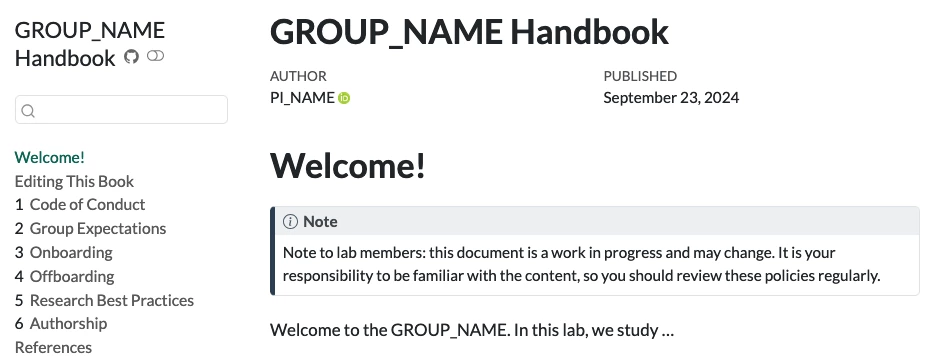Lab Group Handbook Template and Workshop

Having a lab handbook—a document that conveys group ethos, expectations, policies and procedures—can go a long way to improving equity and productivity in a lab group (Tendler et al. 2023). The format of such a handbook can be as simple as a Word document on a shared drive, but we wanted to share some of the features we love about creating our own group procedures book with Quarto. To that end, I created a template repository on GitHub that researchers at the U of A (or anywhere) can use as a starting point to create their own book using Quarto, an “open-source scientific and technical publishing system”. The template creates a Quarto book hosted on GitHub pages that is searchable and editable (via GitHub). I believe that this setup (GitHub + Quarto) is great for a lab handbook for a few reasons:
- GitHub allows you to manage edits in a reasonable way by allowing any lab member to contribute changes but giving a PI ultimate control over merging of edits
- Books built with Quarto have great default features, but are also very flexible and fairly easy to learn
- Both GitHub and Quarto are very useful tools for academics (see this great talk on Quarto for Academics)
- GitHub and Quarto are also highly transferable skills, making the learning curve totally worth it for trainees

Screenshot of the rendered template lab handbook before any editing is done.
The template is more than just a skeleton—it includes detailed instructions on how to deploy the book, different ways to make edits to the book, my recommendations on file naming and organization for research projects, a code of conduct with U of A specific links, and thought-provoking discussion questions to help you and your lab group make the handbook your own.
Our August workshop was on getting set up with GitHub and Quarto and using this template to publish your own lab handbook. Follow along with the slides or the video to get the template and make your own book! As usual, we are happy to answer any questions at our drop-in hours.

